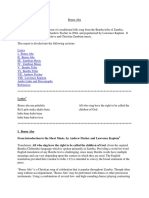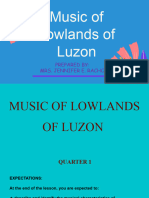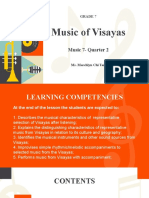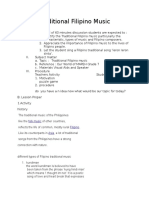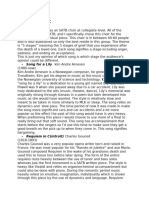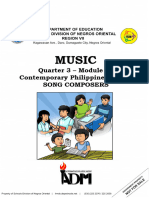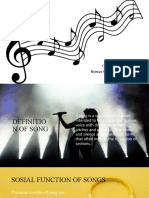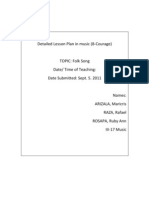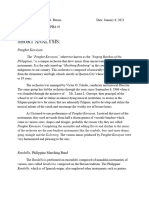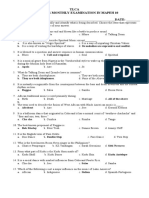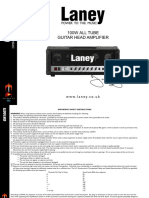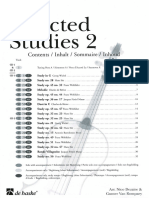Music G7
Music G7
Uploaded by
zklin69Copyright:
Available Formats
Music G7
Music G7
Uploaded by
zklin69Copyright
Available Formats
Share this document
Did you find this document useful?
Is this content inappropriate?
Copyright:
Available Formats
Music G7
Music G7
Uploaded by
zklin69Copyright:
Available Formats
Name: Rose Dominique A.
Berino Date: October 17, 2020
Subject: Music Q2 Exam Grade Level: 7
PBA TITLE: CRITIQUE PAPER
"Sa Kabukiran" was originally written for soprano and was first introduced in Cebu in 1928. Its
lively and happy melody reflects life in the countryside or farmlands. It was composed by
Manuel Velez for the theater play about a young mountain girl. Originally written in Visayan
(Cebuano), it was later translated to other dialects/languages like Tagalog by L. Celerio, Ilonggo
by F. Zaragosa, Ilocano by L. Pichay, English by J. Climaco and Spanish by J. Gavira. Movie
personalities at that time (Lilian Velez, Elsa Oria and Nora Hermosa) performed the song. It was
also sung by Sylvia La Torre, who was a conservatory-trained soprano and who has an illustrious
career in Philippine cinema and television.
I consider the song "Sa Kabukiran" one of our folk songs. It has a simple melody, with the verses
written in stanzas, like in a poem, and in narrative form. The song has a simple harmony and
lyrics. It describes the simple life of the people in the countryside. The words portray a plain and
unsophisticated way of life, one that brings joy and comfort to the heart. During the singing of
the song, some of the lines were repeated, making it easier to remember the lyrics. I noticed,
however, that it was sung with very high notes, like in an opera. It was actually the first thing
that I noticed upon hearing it. I always thought that folk songs have low notes and sung in a
relaxed and easy voice. This is the first time I heard one sung like it.
While listening to the song, I realized that I was not really listening to it. I should be
concentrating on the song and learning to appreciate it. After about three replays, I finally
understood why. I was just hearing the song, but I wasn't really understanding the lessons it was
telling me. The song title itself sounded boring - I thought it will all be about living in the
province and showing how to plant crops; instead it is an enjoyable song, with values referred to,
one just have to listen with an open heart and open mind.
I find the song "Sa Kabukiran" unique, compared to current Filipino songs. It tells the listeners
about life in the barrio, specifically the farm. For me, the lesson I learned is: "Living in the
province is easier and provides happiness in its simple ways." But of course, all of us can learn a
different lesson because we all have different points of view.
You might also like
- Gesu BambinoDocument13 pagesGesu BambinoCarrie SanderNo ratings yet
- Sa Duyan NG SiningDocument6 pagesSa Duyan NG SiningMikaela Frani86% (7)
- What Is A Search and Rescue Transponder (SART)Document4 pagesWhat Is A Search and Rescue Transponder (SART)Ertan KoseNo ratings yet
- ADM Media Arts 9 - Q1 W1Document17 pagesADM Media Arts 9 - Q1 W1SirDadz BornalesNo ratings yet
- English File: 8 Quick TestDocument2 pagesEnglish File: 8 Quick TestЕкатерина100% (1)
- Jungkook Cover Version: Trans. Pei-Wen TanDocument8 pagesJungkook Cover Version: Trans. Pei-Wen TanShannen IbayNo ratings yet
- Teaching Music in Elementary Grades Lea R. RobrigadoDocument8 pagesTeaching Music in Elementary Grades Lea R. RobrigadoLea Retanan RobrigadoNo ratings yet
- Harana By:parokya Ni EdgarDocument16 pagesHarana By:parokya Ni EdgarJoyce JavierNo ratings yet
- Quarter 1 Module 1 Mapeh 7Document12 pagesQuarter 1 Module 1 Mapeh 7John Mark PrestozaNo ratings yet
- Mapeh#1 (3rdquart)Document1 pageMapeh#1 (3rdquart)chandidub10No ratings yet
- Quarter 1 Module 1 Mapeh 7Document13 pagesQuarter 1 Module 1 Mapeh 7Renny Romero Luzada100% (1)
- Music of Lowlands of LuzonDocument19 pagesMusic of Lowlands of LuzonCECILIA PORDONZALANNo ratings yet
- Music 7: Ma. Thea Carmela P. EdadesDocument36 pagesMusic 7: Ma. Thea Carmela P. EdadesJoam Christangel OdavarNo ratings yet
- Research TiwasDocument7 pagesResearch TiwasNeWo YanTotNo ratings yet
- Stories From An Island City - ProgrammeDocument15 pagesStories From An Island City - ProgrammeThe TENG CompanyNo ratings yet
- Bonse AbaDocument11 pagesBonse AbaVerónica Valencia PajueloNo ratings yet
- Music7 Slem1 Q1Document30 pagesMusic7 Slem1 Q1third sta. anaNo ratings yet
- Music of Lowlands of Luzon Folk Songs From The LowlandsDocument25 pagesMusic of Lowlands of Luzon Folk Songs From The LowlandsAda Denice FigueroaNo ratings yet
- LECTURE-philippine Folk SongsDocument30 pagesLECTURE-philippine Folk SongsJase SunNo ratings yet
- Music of Visayas-Quarter 2Document14 pagesMusic of Visayas-Quarter 2Paulo AngeloNo ratings yet
- Q1 MAPEH 7moduleDocument41 pagesQ1 MAPEH 7moduleDea GoNo ratings yet
- Day2ppt 1Document21 pagesDay2ppt 1Karl CortezNo ratings yet
- Filipino ComposersDocument4 pagesFilipino ComposersRod Rafael De LeonNo ratings yet
- Presentation No. 3 - Songs and ChantsDocument44 pagesPresentation No. 3 - Songs and Chantsandie hinchNo ratings yet
- Music - Filipino ComposersDocument70 pagesMusic - Filipino ComposersIan Kirby Formeloza SolpicoNo ratings yet
- Filipino Music LPDocument6 pagesFilipino Music LPIceyYamahaNo ratings yet
- Liturgy and Devotional Music LowlandsDocument110 pagesLiturgy and Devotional Music LowlandsMatt The idkNo ratings yet
- Where and When Did Pansori Originate?Document3 pagesWhere and When Did Pansori Originate?noelle roblesNo ratings yet
- Philippine Contemporary MusicDocument4 pagesPhilippine Contemporary MusicBlessy Ruth BismonteNo ratings yet
- Music: Quarter 1 - Module 1: Music of Lowlands of Luzon Folk Songs From The LowlandsDocument21 pagesMusic: Quarter 1 - Module 1: Music of Lowlands of Luzon Folk Songs From The LowlandsRonenPasahol0% (1)
- Folk SongsDocument3 pagesFolk SongsFaith Marie EmnasNo ratings yet
- Levi Celerio: President Fidel V. Ramos National Artist For Music and LiteratureDocument8 pagesLevi Celerio: President Fidel V. Ramos National Artist For Music and LiteratureMcheal Pay-anNo ratings yet
- Kundiman 2-1Document10 pagesKundiman 2-1mahinayjaniahshaneNo ratings yet
- MusicDocument35 pagesMusicAbbeyNo ratings yet
- GRADE 7 MUSIC Q1 Wk1Document5 pagesGRADE 7 MUSIC Q1 Wk1Elma AlbertoNo ratings yet
- Vocal Music of Lowland: LuzonDocument25 pagesVocal Music of Lowland: LuzonTrisha MenesesNo ratings yet
- New Music ComposersDocument22 pagesNew Music ComposersAJNo ratings yet
- Learning Task 1.1: - Music-Aarael Mae Ramos BismuthDocument4 pagesLearning Task 1.1: - Music-Aarael Mae Ramos Bismuthhejajsndjds sdkjsdNo ratings yet
- New Music ComposersDocument22 pagesNew Music ComposersryanbermejofaderoNo ratings yet
- Choir concert programDocument2 pagesChoir concert programNeveya FletcherNo ratings yet
- MUSIC 7 PPT No. 2 L3 and L4 PDFDocument17 pagesMUSIC 7 PPT No. 2 L3 and L4 PDFLara JeonNo ratings yet
- New Music ComposersDocument22 pagesNew Music ComposersRaven PanganibanNo ratings yet
- THE Music OF Luzon (Lowlan DS) : S T. M Atthew Academy of Cavite A Christ Centered-SchoolDocument5 pagesTHE Music OF Luzon (Lowlan DS) : S T. M Atthew Academy of Cavite A Christ Centered-SchoolJessa AbasulaNo ratings yet
- New Music Composers Autosaved - 011740Document22 pagesNew Music Composers Autosaved - 011740KlieNo ratings yet
- mODULES WEEK 5 G7Document3 pagesmODULES WEEK 5 G7Israel MarquezNo ratings yet
- Junior High School Department: Mapeh 7 (1St Quarter)Document75 pagesJunior High School Department: Mapeh 7 (1St Quarter)Alliah Joy PalacpacNo ratings yet
- Local Media4460954299810523856Document13 pagesLocal Media4460954299810523856fneighbour376No ratings yet
- Art of MusicDocument22 pagesArt of MusicMira cle StarNo ratings yet
- MAPEH 7 Q2 M2 - RemovedDocument9 pagesMAPEH 7 Q2 M2 - RemovedJohn Prince FontanillaNo ratings yet
- Vocal Music of Southeast AsiaDocument12 pagesVocal Music of Southeast AsiaDanna LabanNo ratings yet
- Created By: Nyimas Sabrina Salsa Haliza 11 IPS 2Document6 pagesCreated By: Nyimas Sabrina Salsa Haliza 11 IPS 2Arif Ahmad DhaniNo ratings yet
- Mapeh 10 Q3 M4 10 SteDocument30 pagesMapeh 10 Q3 M4 10 Stepetergomez0119No ratings yet
- Music ProjDocument34 pagesMusic ProjMika-chan VilarNo ratings yet
- Kundiman Is A Genre of Traditional Filipino Love Songs. The Lyrics of The Kundiman AreDocument3 pagesKundiman Is A Genre of Traditional Filipino Love Songs. The Lyrics of The Kundiman AreGrechelle Audrey T. CasmoNo ratings yet
- 3RD QUARTER - Music-Grade-10-Module-2Document15 pages3RD QUARTER - Music-Grade-10-Module-2Alex May100% (1)
- Andile YenanaDocument6 pagesAndile YenanaChester Ntsika Anathi Summerton100% (1)
- Lopez, Ella Marie P. FIN192 Output#2 Art Appreciation-Music-FinalsDocument3 pagesLopez, Ella Marie P. FIN192 Output#2 Art Appreciation-Music-FinalsElla Marie LopezNo ratings yet
- Musc Selection From The Lowlands of LuzonDocument9 pagesMusc Selection From The Lowlands of LuzonRizzamae Cutillas FelipeNo ratings yet
- Philippine Vocal Forms: Prepared by Maribel M. Morada-De LunaDocument23 pagesPhilippine Vocal Forms: Prepared by Maribel M. Morada-De Lunamaribel de lunaNo ratings yet
- 2.the Piano-D.h.lawrence-1Document20 pages2.the Piano-D.h.lawrence-1Maa TherNo ratings yet
- Galing Ni afaXDDocument8 pagesGaling Ni afaXDALdriene CristeNo ratings yet
- Module 1:music of Luzon (Highlands and Lowlands)Document3 pagesModule 1:music of Luzon (Highlands and Lowlands)Karen Jamito Madridejos100% (1)
- Jystel ReviewerrDocument8 pagesJystel Reviewerrdenmarkbulda2112No ratings yet
- StudenthandbookDocument5 pagesStudenthandbookapi-439220457No ratings yet
- G7 - HealthDocument2 pagesG7 - Healthzklin69No ratings yet
- Reflection PaperDocument2 pagesReflection Paperzklin69No ratings yet
- Informative EssayDocument2 pagesInformative Essayzklin69No ratings yet
- AnalysisDocument2 pagesAnalysiszklin69No ratings yet
- Q3 Grade10 Fems 2023-2024Document15 pagesQ3 Grade10 Fems 2023-2024zklin69No ratings yet
- Music Theory 4 Worksheet No. 1: Part 1: Identify The Mode by CharacteristicsDocument4 pagesMusic Theory 4 Worksheet No. 1: Part 1: Identify The Mode by CharacteristicsPaolo DanoNo ratings yet
- Practice Set - 3: Directions (11-12) : in Each of These Question, One Spotting ErrorsDocument5 pagesPractice Set - 3: Directions (11-12) : in Each of These Question, One Spotting Errorsrovhu ghjfiNo ratings yet
- Grade 10 MapehDocument3 pagesGrade 10 MapehJayJay TimothyNo ratings yet
- Ernest ChaussonDocument2 pagesErnest ChaussonRachel SinghNo ratings yet
- EMCEE ScriptDocument2 pagesEMCEE ScriptJanmarkNo ratings yet
- Music MinistryDocument18 pagesMusic Ministrygenesel0519No ratings yet
- Tactical Optical Fiber Cable Keyoptics 2009-10-09Document44 pagesTactical Optical Fiber Cable Keyoptics 2009-10-09clinton ruleNo ratings yet
- Pub - The Cassandra Complex Living With Disbelief A ModeDocument299 pagesPub - The Cassandra Complex Living With Disbelief A ModeKelly Medford100% (1)
- Exercise: Unit 2 IntermediateDocument1 pageExercise: Unit 2 IntermediatePotencia SalasNo ratings yet
- Asian VLF Observation Network Pontianak Station: - UpdateDocument13 pagesAsian VLF Observation Network Pontianak Station: - UpdateOemar BakrieNo ratings yet
- 1193681Document2 pages1193681Maurice GhanemNo ratings yet
- Basic KPIDocument15 pagesBasic KPIshyamal kumarNo ratings yet
- Nwagwu Akintoye 2023 Influence of Social Media On The Uptake of Emerging Musicians and Entertainment EventsDocument26 pagesNwagwu Akintoye 2023 Influence of Social Media On The Uptake of Emerging Musicians and Entertainment EventsTeresa WinterNo ratings yet
- Massive MIMO SeminarDocument26 pagesMassive MIMO SeminarelsadigsaeidNo ratings yet
- Oriental (Granados)Document11 pagesOriental (Granados)Fagner violonistaNo ratings yet
- Lupang Hinirang: Sofilasore Latidotilatiso Sofilasore Latidotilaso (2X)Document5 pagesLupang Hinirang: Sofilasore Latidotilatiso Sofilasore Latidotilaso (2X)Allen OjoNo ratings yet
- Classial DanceDocument2 pagesClassial DanceEdwin EstradaNo ratings yet
- MOS Assignment - IV and VDocument4 pagesMOS Assignment - IV and VGopinath GangadhariNo ratings yet
- Puntos Pendientes Por Redimir 14 Diciembre 2022Document51 pagesPuntos Pendientes Por Redimir 14 Diciembre 2022Recepcion CasinoNo ratings yet
- Noblex: SERVICE MANUAL Colour TelevisionDocument29 pagesNoblex: SERVICE MANUAL Colour Televisionjose4445No ratings yet
- French Opera 3Document14 pagesFrench Opera 3Viken Tchalian SaxophoneNo ratings yet
- ArtsDocument17 pagesArtsJaycon Baquial IINo ratings yet
- Laney GH100TIDocument16 pagesLaney GH100TIarmingoriNo ratings yet
- Mobile ComputingDocument189 pagesMobile Computingabhinav.a.csit.2020No ratings yet
- Selected Studies 2Document33 pagesSelected Studies 2pedrohpv009No ratings yet















